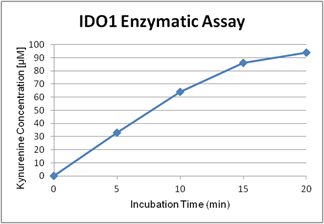IDO (human) (rec.) (His) (highly active)
| Code | Size | Price |
|---|
| AG-40B-0161-C050 | 50 ug | £367.00 |
Quantity:
Prices exclude any Taxes / VAT
Overview
Regulatory Status: RUO
Target Species: Human
Shipping:
Dry Ice
Storage:
-20°C (short term) -80°C (long term).
Images
Documents
Further Information
Alternate Names/Synonyms:
Indoleamine 2,3-dioxygenase 1; INDO; IDO
Biological Activity:
Specific Activity: >100?000U/mg protein with L-tryptophan as substrate (activity assay with catalase). One unit is defined as the amount of enzyme that produces 1nmol of N-formylkynurenine (NFK) per hour. For more information see Activity Test Protocol.
Concentration:
Lot dependent
EClass:
32160000
Endotoxin:
<0.1EU/µg purified protein (LAL test).
Form (Short):
liquid
Formulation:
Liquid. 0.2µm-filtered solution in 10mM Tris, pH 7.5, containing 100mM NaCl and 20% glycerol.
Handling Advice:
After opening, prepare aliquots and store at -80°C.Avoid freeze/thaw cycles.
Long Description:
Protein. Human IDO (aa 1-403) is fused at the N-terminus to a His-tag. Source: E. coli. Endotoxin content: <0.1EU/µg purified protein (LAL test; Lonza). Liquid. 0.2µm-filtered solution in 10mM Tris, pH 7.5, containing 100mM NaCl and 20% glycerol. Purity: >90% (SDS-PAGE). IDO is a heme enzyme that catalyzes the first and rate-limiting step in the main pathway of human tryptophan catabolism, the kynurenine pathway, causing depletion of tryptophan which can lead to halted growth of microbes as well as T cells. IDO is an immune checkpoint protein, thought to play a role in a variety of pathophysiological processes such as antimicrobial and antitumor defense, neuropathology, immunoregulation and antioxidant activity. Cancer cells are able to evade the immune system is by hijacking the checkpoint proteins. Increased IDO protein levels drive growth arrest and apoptosis of the effector T cells, a group of immune cells that mediate the immune system?s ability to destroy pathogens. By reducing the number of effector T cells, IDO overexpression prevents the immune system from effectively destroying cancer cells. IDO overexpression has been observed in a wide range of human cancers such as prostatic, colorectal, pancreatic, cervical, gastric, ovarian, head or lung cancer. Physiological IDO activity has been implicated in T cell tolerance to tumors, dysfunctional selftolerance in non-obese diabetic (NOD) mice, and as a protective negative regulator in autoimmune disorders. Biological active IDO enzyme can be used for screening of IDO inhibitors, which have shown promising antitumor activity and appear to be synergistic in combination with chemotherapy and other forms of immunotherapy.
Molecular Weight:
~47kDa (SDS-PAGE)
NCBI, Uniprot Number:
P14902
Package Type:
Plastic Vial
Product Description:
IDO1 is a heme enzyme that catalyzes the first and rate-limiting step in the main pathway of human tryptophan catabolism, the kynurenine pathway, causing depletion of tryptophan which can lead to halted growth of microbes as well as T cells. IDO1 is an immune checkpoint protein, thought to play a role in a variety of pathophysiological processes such as antimicrobial and antitumor defense, neuropathology, immunoregulation and antioxidant activity. Cancer cells are able to evade the immune system is by hijacking the checkpoint proteins. Increased IDO1 protein levels drive growth arrest and apoptosis of the effector T cells, a group of immune cells that mediate the immune system?s ability to destroy pathogens. By reducing the number of effector T cells, IDO1 overexpression prevents the immune system from effectively destroying cancer cells. IDO1 overexpression has been observed in a wide range of human cancers such as prostatic, colorectal, pancreatic, cervical, gastric, ovarian, head or lung cancer. Physiological IDO1 activity has been implicated in T cell tolerance to tumors, dysfunctional selftolerance in non-obese diabetic (NOD) mice, and as a protective negative regulator in autoimmune disorders. Biological active IDO1 enzyme can be used for screening of IDO1 inhibitors, which have shown promising antitumor activity and appear to be synergistic in combination with chemotherapy and other forms of immunotherapy.
Purity:
>90% (SDS-PAGE)
Sequence:
Human IDO1 (aa 1-403) is fused at the N-terminus to a His-tag.
Source / Host:
E. coli
TAGs:
His
Transportation:
Non-hazardous
UNSPSC Category:
Other Proteins
UNSPSC Number:
12352202
Use & Stability:
Stable for at least 1 year after receipt when stored at -80°C.



